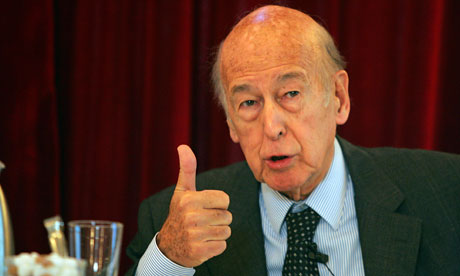Helena Smith in Athens guardian.co.uk,
Sunday 11 December 2011 19.59 GMT
When Nicolas Sarkozy said 'some' should clearly not have joined the euro club, Greece was no doubt on his mind
Valery Giscard d'Estaing was very keen for Greece to become part of the EU family when he was president of France. Photograph: Damien Meyer/AFP
More than once, the debt-burdened Greeks have heard how they should never have entered the single currency. And on the eve of Friday's make-or-break summit, as French President Nicolas Sarkozy warned that the euro was at risk of "disintegration", he repeated that there were "some" who should clearly not have joined the club.
Hours earlier, one of his predecessors, Valéry Giscard d'Estaing, who will go down in history as doing more than anyone else outside of Athens to champion Greece's cause, came close to admitting the same thing. "Greece could stay in the eurozone but it is very difficult to achieve economic recovery with a strong currency," he said. "Is it better to use a national currency for a period, or have the safety of a strong currency?" he asked. "It is Greece's choice."
Speculation over Athens's possible exit from the eurozone is unlikely to end soon. Deutsche Bank experts predicted that a Greek departure from the 17-member bloc would continue to top the list of the 10 biggest risks investors should look out for. Greece was the 10th country to be embraced as a full member of the then European Economic Community (EEC) in 1981. The rationale behind its admission was as much romantic as geopolitical. As the birthplace of democracy and fount of European civilisation, France in particular felt that the organisation would be incomplete without Athens.
Thanks to Giscard d'Estaing's relentless support Greece signed up before either Spain or Portugal which had to wait a further five years.
"It not only joined five years ahead of Spain, which was much more developed, but just as significantly it entered alone," said Dimitris Kerides who teaches international relations at the university of Macedonia. "The symbolic romantic element of Greece's accession was very strong."
Astute diplomacy – and a little bit of cajoling – by the audacious Konstantinos Karamanlis, who oversaw the country's return to democracy in 1974, also played a role. Following the collapse of military rule, the conservative leader ended seven years of self-imposed exile in Paris flying back to Athens in the presidential jet of his old friend, Giscard d'Estaing.
Less than five years later Athens had signed an accession treaty with the EEC.
"European technocrats were convinced that Greece wasn't ready, which it wasn't, but they were overturned by politicians," said Keridis. "Karamanlis used all the leverage at his disposal, visiting Bonn when the German chancellor, Helmut Schmidt, became reluctant and openly playing the guilt card, citing the devastation it had visited on Greece during the second world war."
Predictably, the capital was far from prepared when the French president and other leaders flew into Athens for the ceremony. To soften their landing, Karamanlis ordered that the old road linking the airport to the city centre be spruced up. In record speed it was turned into a four-lane highway. Giscard d'Estaing and his European partners, liked what they saw. They were taken in.
Greece's euro future: the speculation goes on | Business | The Guardian
![The [Greek] European Tragedy](https://blogger.googleusercontent.com/img/b/R29vZ2xl/AVvXsEiWKI5s90SFm1wWTk6bs4p7CgslaC2SnYPsrZhb-B-smOufNNCSxCvpBLI9hOB-LsXZjir_PNmEiMk2-E62F3xkg96IoC6QFAaZAnPRTVH340IN9WBRmWJqPkjWlgyRj3zpALp7h6hvA58/s920/GkBack_new.jpg)
